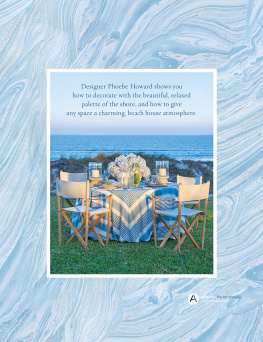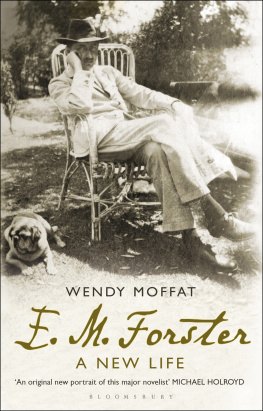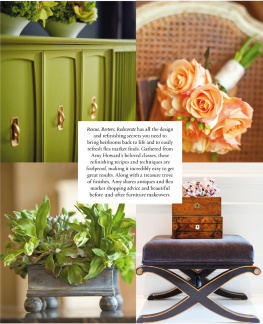Edward Morgan Forster - Howards End
Here you can read online Edward Morgan Forster - Howards End full text of the book (entire story) in english for free. Download pdf and epub, get meaning, cover and reviews about this ebook. genre: Prose. Description of the work, (preface) as well as reviews are available. Best literature library LitArk.com created for fans of good reading and offers a wide selection of genres:
Romance novel
Science fiction
Adventure
Detective
Science
History
Home and family
Prose
Art
Politics
Computer
Non-fiction
Religion
Business
Children
Humor
Choose a favorite category and find really read worthwhile books. Enjoy immersion in the world of imagination, feel the emotions of the characters or learn something new for yourself, make an fascinating discovery.

- Book:Howards End
- Author:
- Genre:
- Rating:5 / 5
- Favourites:Add to favourites
- Your mark:
- 100
- 1
- 2
- 3
- 4
- 5
Howards End: summary, description and annotation
We offer to read an annotation, description, summary or preface (depends on what the author of the book "Howards End" wrote himself). If you haven't found the necessary information about the book — write in the comments, we will try to find it.
Howards End — read online for free the complete book (whole text) full work
Below is the text of the book, divided by pages. System saving the place of the last page read, allows you to conveniently read the book "Howards End" online for free, without having to search again every time where you left off. Put a bookmark, and you can go to the page where you finished reading at any time.
Font size:
Interval:
Bookmark:
Chapter 1
One may as well begin with Helen's letters to her sister.
Howards End,
Tuesday.
Dearest Meg,
It isn't going to be what we expected. It is old and little, and altogether delightfulred brick. We can scarcely pack in as it is, and the dear knows what will happen when Paul (younger son) arrives tomorrow. From hall you go right or left into dining-room or drawing-room. Hall itself is practically a room. You open another door in it, and there are the stairs going up in a sort of tunnel to the first-floor. Three bedrooms in a row there, and three attics in a row above. That isn't all the house really, but it's all that one noticesnine windows as you look up from the front garden.
Then there's a very big wych-elmto the left as you look upleaning a little over the house, and standing on the boundary between the garden and meadow. I quite love that tree already. Also ordinary elms, oaksno nastier than ordinary oakspear-trees, apple-trees, and a vine. No silver birches, though. However, I must get on to my host and hostess. I only wanted to show that it isn't the least what we expected. Why did we settle that their house would be all gables and wiggles, and their garden all gamboge-coloured paths? I believe simply because we associate them with expensive hotelsMrs. Wilcox trailing in beautiful dresses down long corridors, Mr. Wilcox bullying porters, etc. We females are that unjust.
I shall be back Saturday; will let you know train later. They are as angry as I am that you did not come too; really Tibby is too tiresome, he starts a new mortal disease every month. How could he have got hay fever in London? and even if he could, it seems hard that you should give up a visit to hear a schoolboy sneeze. Tell him that Charles Wilcox (the son who is here) has hay fever too, but he's brave, and gets quite cross when we inquire after it. Men like the Wilcoxes would do Tibby a power of good. But you won't agree, and I'd better change the subject.
This long letter is because I'm writing before breakfast. Oh, the beautiful vine leaves! The house is covered with a vine. I looked out earlier, and Mrs. Wilcox was already in the garden. She evidently loves it. No wonder she sometimes looks tired. She was watching the large red poppies come out. Then she walked off the lawn to the meadow, whose corner to the right I can just see. Trail, trail, went her long dress over the sopping grass, and she came back with her hands full of the hay that was cut yesterdayI suppose for rabbits or something, as she kept on smelling it. The air here is delicious. Later on I heard the noise of croquet balls, and looked out again, and it was Charles Wilcox practising; they are keen on all games. Presently he started sneezing and had to stop. Then I hear more clicketing, and it is Mr. Wilcox practising, and then, 'a-tissue, a-tissue': he has to stop too. Then Evie comes out, and does some calisthenic exercises on a machine that is tacked on to a greengage-treethey put everything to useand then she says 'a-tissue,' and in she goes. And finally Mrs. Wilcox reappears, trail, trail, still smelling hay and looking at the flowers. I inflict all this on you because once you said that life is sometimes life and sometimes only a drama, and one must learn to distinguish t'other from which, and up to now I have always put that down as 'Meg's clever nonsense.' But this morning, it really does seem not life but a play, and it did amuse me enormously to watch the W's. Now Mrs. Wilcox has come in.
I am going to wear [omission]. Last night Mrs. Wilcox wore an [omission], and Evie [omission]. So it isn't exactly a go-as-you-please place, and if you shut your eyes it still seems the wiggly hotel that we expected. Not if you open them. The dog-roses are too sweet. There is a great hedge of them over the lawnmagnificently tall, so that they fall down in garlands, and nice and thin at the bottom, so that you can see ducks through it and a cow. These belong to the farm, which is the only house near us. There goes the breakfast gong. Much love. Modified love to Tibby. Love to Aunt Juley; how good of her to come and keep you company, but what a bore. Burn this. Will write again Thursday.
Helen
Howards End,
Friday.
Dearest Meg,
I am having a glorious time. I like them all. Mrs. Wilcox, if quieter than in Germany, is sweeter than ever, and I never saw anything like her steady unselfishness, and the best of it is that the others do not take advantage of her. They are the very happiest, jolliest family that you can imagine. I do really feel that we are making friends. The fun of it is that they think me a noodle, and say soat least Mr. Wilcox doesand when that happens, and one doesn't mind, it's a pretty sure test, isn't it? He says the most horrid things about women's suffrage so nicely, and when I said I believed in equality he just folded his arms and gave me such a setting down as I've never had. Meg, shall we ever learn to talk less? I never felt so ashamed of myself in my life. I couldn't point to a time when men had been equal, nor even to a time when the wish to be equal had made them happier in other ways. I couldn't say a word. I had just picked up the notion that equality is good from some bookprobably from poetry, or you. Anyhow, it's been knocked into pieces, and, like all people who are really strong, Mr. Wilcox did it without hurting me. On the other hand, I laugh at them for catching hay fever. We live like fighting-cocks, and Charles takes us out every day in the motora tomb with trees in it, a hermit's house, a wonderful road that was made by the Kings of Merciatennisa cricket matchbridgeand at night we squeeze up in this lovely house. The whole clan's here nowit's like a rabbit warren. Evie is a dear. They want me to stop over SundayI suppose it won't matter if I do. Marvellous weather and the view's marvellousviews westward to the high ground. Thank you for your letter. Burn this.
Your affectionate
Helen
Howards End,
Sunday.
Dearest, dearest Meg,I do not know what you will say: Paul and I are in lovethe younger son who only came here Wednesday.
Chapter 2
Margaret glanced at her sister's note and pushed it over the breakfast-table to her aunt. There was a moment's hush, and then the flood-gates opened.
"I can tell you nothing, Aunt Juley. I know no more than you do. We metwe only met the father and mother abroad last spring. I know so little that I didn't even know their son's name. It's all so" She waved her hand and laughed a little.
"In that case it is far too sudden."
"Who knows, Aunt Juley, who knows?"
"But, Margaret dear, I mean we mustn't be unpractical now that we've come to facts. It is too sudden, surely."
"Who knows!"
"But Margaret dear"
"I'll go for her other letters," said Margaret. "No, I won't, I'll finish my breakfast. In fact, I haven't them. We met the Wilcoxes on an awful expedition that we made from Heidelberg to Speyer. Helen and I had got it into our heads that there was a grand old cathedral at Speyerthe Archbishop of Speyer was one of the seven electorsyou know'Speyer, Maintz, and Kln.' Those three sees once commanded the Rhine Valley and got it the name of Priest Street."
"I still feel quite uneasy about this business, Margaret."
"The train crossed by a bridge of boats, and at first sight it looked quite fine. But oh, in five minutes we had seen the whole thing. The cathedral had been ruined, absolutely ruined, by restoration; not an inch left of the original structure. We wasted a whole day, and came across the Wilcoxes as we were eating our sandwiches in the public gardens. They too, poor things, had been taken inthey were actually stopping at Speyerand they rather liked Helen insisting that they must fly with us to Heidelberg. As a matter of fact, they did come on next day. We all took some drives together. They knew us well enough to ask Helen to come and see themat least, I was asked too, but Tibby's illness prevented me, so last Monday she went alone. That's all. You know as much as I do now. It's a young man out the unknown. She was to have come back Saturday, but put off till Monday, perhaps on account ofI don't know.
Font size:
Interval:
Bookmark:
Similar books «Howards End»
Look at similar books to Howards End. We have selected literature similar in name and meaning in the hope of providing readers with more options to find new, interesting, not yet read works.
Discussion, reviews of the book Howards End and just readers' own opinions. Leave your comments, write what you think about the work, its meaning or the main characters. Specify what exactly you liked and what you didn't like, and why you think so.







